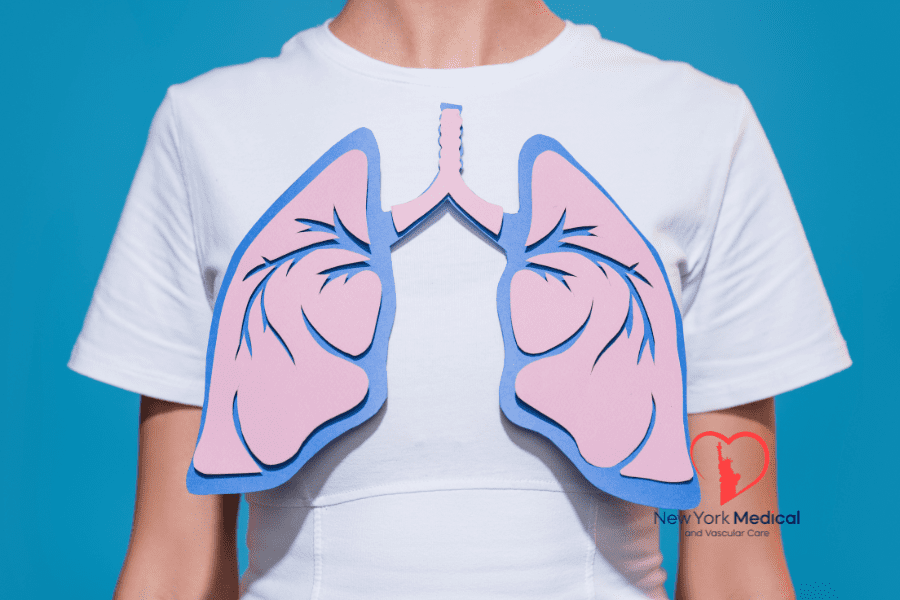Bronchitis is a common respiratory condition that affects millions of people each year. It occurs when the bronchial tubes, which carry air to your lungs, become inflamed, leading to coughing and difficulty breathing. While bronchitis can be acute or chronic, understanding its symptoms, preventive measures, and treatment options can help you manage this condition effectively. At New York Medical and Vascular Care (NYMVCare), we are committed to providing comprehensive care for respiratory health. Here’s what you need to know about bronchitis.
What is Bronchitis?
Bronchitis is the inflammation of the bronchial tubes, often caused by infections or environmental factors. There are two main types:
- Acute Bronchitis: Typically caused by a viral infection, such as the common cold or flu. Symptoms usually resolve within a few weeks.
- Chronic Bronchitis: A long-term condition often associated with smoking or exposure to irritants. A key component of chronic obstructive pulmonary disease (COPD).
Symptoms of Bronchitis
The symptoms of bronchitis can vary depending on its type but commonly include:
- Persistent cough, often producing mucus (yellow, green, or clear).
- Wheezing or shortness of breath.
- Chest discomfort or tightness.
- Fatigue and general malaise.
- Sore throat and nasal congestion (more common in acute bronchitis).
- Fever and chills (occasionally in acute bronchitis).
If symptoms last longer than three weeks or worsen, it’s essential to seek medical attention, as this could indicate a more serious condition.
Prevention of Bronchitis
Preventing bronchitis involves minimizing exposure to risk factors and maintaining a healthy respiratory system. Here are some practical steps:
- Avoid Smoking: Smoking is a leading cause of chronic bronchitis and irritates the airways. Quitting smoking significantly reduces your risk.
- Limit Exposure to Irritants: Avoid pollutants, dust, and chemical fumes by wearing protective gear when necessary and ensuring proper ventilation.
- Practice Good Hygiene: Wash your hands regularly to reduce the risk of viral infections. Avoid close contact with people who are sick, especially during cold and flu season.
- Strengthen Your Immune System: Eat a balanced diet rich in fruits and vegetables, exercise regularly, and get adequate sleep to boost your immunity.
- Get Vaccinated: Stay up-to-date with vaccines like the flu shot and pneumococcal vaccine to prevent respiratory infections that can lead to bronchitis.
Treatment Options for Bronchitis
Treatment for bronchitis focuses on relieving symptoms and addressing the underlying cause. Options include:
Self-Care for Acute Bronchitis:
- Rest: Allow your body time to recover.
- Stay Hydrated: Drink plenty of fluids to thin mucus and ease coughing.
- Use a Humidifier: Adding moisture to the air can soothe irritated airways.
- Over-the-Counter Medications: Use pain relievers like acetaminophen or ibuprofen for fever and discomfort. Cough suppressants may be used if coughing disrupts sleep.
Medical Treatments:
- Bronchodilators: Medications that relax the airways and make breathing easier, especially for chronic bronchitis or COPD patients.
- Inhaled Corticosteroids: Reduce airway inflammation and are often used for chronic cases.
- Antibiotics: Prescribed only if a bacterial infection is suspected (rare in acute bronchitis).
- Pulmonary Rehabilitation: A program that combines exercise, education, and support to improve lung function, particularly for chronic bronchitis patients.
Addressing Chronic Bronchitis: Chronic bronchitis requires long-term management, including lifestyle changes, medication, and regular monitoring by a healthcare provider.
When to See a Doctor
Seek medical attention if you experience:
- Symptoms lasting more than three weeks.
- Severe coughing spells that interfere with daily life.
- Shortness of breath or difficulty breathing.
- High fever or chills.
- Blood in your mucus.
Early diagnosis and treatment can prevent complications and improve outcomes.
Bronchitis Care at NYMVCare
At NYMVCare, we provide personalized care for respiratory conditions like bronchitis. Our team of experienced healthcare professionals offers accurate diagnosis, tailored treatment plans, and guidance on preventive measures to help you breathe easier. Whether you’re dealing with acute symptoms or managing a chronic condition, we’re here to support your health journey.
Conclusion
Bronchitis is a common yet manageable condition that can significantly impact your quality of life if left untreated. By recognizing the symptoms, taking preventive steps, and seeking timely medical care, you can reduce your risk and effectively manage this respiratory condition. If you’re experiencing symptoms of bronchitis, schedule an appointment with NYMVC today to receive expert care and support.
Written by DapraLab


